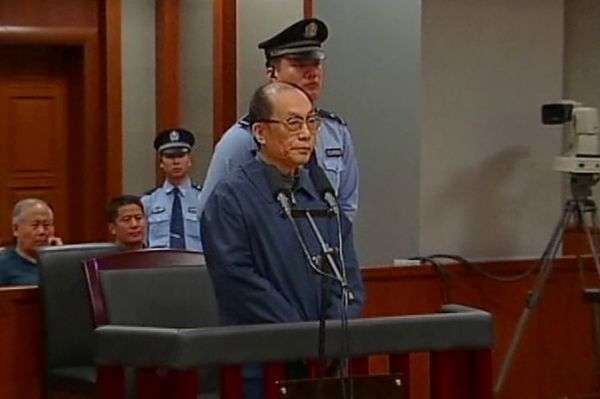


Former Railways Minister Liu Zhijun on trial
By Shen Nianzu (沈念祖), Chen Zhe (陈哲) and Lǚ Xiangrong (吕向荣)
Issue 634, Aug 26, 2013
Nation, page 9
Translated by Zhu Na
Original article: [Chinese]
Last week’s trial of fallen Politburo member Bo Xilai represented one of the highest level political falls in recent Chinese history. But he wasn’t the first high ranking Party member to take the defendant’s stand, and he almost certainly won’t be the last.
When Communist Party officials get charged with serious criminal offenses, they have some tough choices to make. Should they hire a lawyer? If so, who? How should they act in court? And should they try to appeal if convicted?
The official isn’t the only one feeling the heat. Since cases involving high cadres often receive a high degree of scrutiny from the public and higher government officials, everyone involved, from the defense attorneys and prosecutors to the judges, must walk a tightrope while balancing the law and politics.
Lawyering Up
After former Guizhou Party Secretary Liu Fangren (刘方仁) was charged with bribery, he declined to hire a lawyer. He said that he belonged to the Party, so he wouldn’t hire a lawyer to argue against the Party. He would accept whatever the Party meted out to him. He was sentenced to life in prison.
Xu Lanting (许兰亭), a senior lawyer at Beijing Junyong Law Firm and a member of China Lawyers Association, has defended dozens of senior officials. “There are many reasons why officials in high-level cases don’t hire a lawyer at the beginning,” Xu said. “Some don’t have much to dispute in the accusations, some may not be aware of their right to hire a lawyer and some think hiring a lawyer demonstrates a bad attitude; a confrontation with judicial authorities.”
In many cases, like that of former Jiangxi Vice Governor Hu Changqing (胡长清), the first impulse is to try reaching out to official contacts. In Hu’s case, he didn’t see any hope in relying on a lawyer’s defense.
“At the beginning of an official’s fall, their thoughts are still in the ‘political channel,’” said Qian Lieyang (钱列阳), a lawyer at Beijing Tianda Law Firm who’s defended over 50 officials, including former Railways Minister Liu Zhijun. “Our first job after accepting the case is to help the official switch to a ‘legal channel.’”
If officials do decide to hire a lawyer, in most cases they will entrust their family to find one. If they’re not willing to hire their own, sometimes a legal aid center will help to assign one. This is how Qian Lieyang was assigned to defend Liu Zhijun.
Catching the “Hot Potato”
For criminal cases, many lawyers say that it’s hard just to sit down and meet with their client. Yang Kuangsheng (杨矿生), a lawyer from Beijing Zhongtong Law Firm, said that before the amendment of the Criminal Procedure Law, meeting senior officials required approval from officials up the chain of command. This has been changed, but approval is still needed from the Bureau of Corruption Prevention for a lawyer to meet with an official charged with corruption involving more than 500,000 yuan. However, Tian Wenchang (田文昌), a lawyer from Beijing Jingdu Law Firm, says it’s often easier to meet clients in high official cases since the procedures are more standardized.
The most important thing for lawyers to do when they meet a charged official is to build trust. Some officials will worry that the lawyer could be a spy, even if he was hired by the family.
When Qian Lieyang first started meeting with Liu Zhijun, he put Liu at ease by making small talk about historical figures from Hu Shi (胡适) to Fu Sinian (傅斯年). Liu even recommended a book called Cross the South and Return to the North (南渡北归). Qian read the book to try and understand Liu’s world.
“First, you should be neither servile nor overbearing,” said Lawyer Xu Lanting. “Respect them and their personality. This is the foundation for gaining their trust. Moreover, you need to respect their privacy. Don’t ask questions about things unrelated to the case, even if there are lots of rumors floating around.”
But lawyers are often hesitant to touch these high-profile cases. For one thing, the amount of money they stand to make can be laughably small; especially when contrasted with the amount of money involved in the high-level corruption cases.
When Xu Lanting handled former Minister of Land and Resources Tian Fengshan’s bribery case in 2005, he received the standard Beijing legal aid subsidy of 500 yuan. This subsidy was raised in 2011, so when Qian Lieyang defended Liu Zhijun, he and his assistant together received 1,800 yuan for their troubles.
Compensation rises significantly though if defendants hire their own lawyer rather than have one appointed by the state. Lawyer Tian Wenchang said that he charged 50,000 yuan when he defended former Yunnan Governor Li Jiatin (李嘉廷) in 2003.
But no amount of money can eliminate the pressure involved. In 2010, Chongqing judicial official Wen Qiang (文强) got caught up in Bo Xilai’s organized crime crackdown and was charged with taking bribes and raping a university student. Wen’s lawyer, Yang Kuangsheng, stayed in Chongqing for over three months working on the case. “I only slept three or four hours every day,” Yang said. “I smoked eight packs of cigarettes a day and later I had to work while hooked up to an IV drip.”
Qian Lieyang says there can be a lot of uncertainty for the lawyers in these cases from both sides. “For normal cases, if the lawyer can do five things, the client and his family wants us to do eight things,” Qian said. “But when defending high officials, if we can do five things, they only want us to do two things. Every case is like an iceberg. For those of us standing on the shore, 80 percent is hidden from our sight.”
For this reason, high-ranking clients can seem like hot potatoes. Tian Wenchang says high cadre trials have five special characteristics: High sensitivity, easy intervention by the forces outside the law, hard to obtain evidence, complicated details and high risk for lawyers.
“The legal environment in Chinese society still isn’t very good,” Tian said. “Some cases involving high officials are more sensitive and the background is more complicated. The law itself can’t solve it. These cases are often the result of power struggles, so if a lawyer wants to handle one seriously, he’ll face many challenges and risks.”
Show Time
Where the trial is held is now a sensitive issue in high-profile cases. Before 2001, most cases went to trial wherever the crimes were committed or where the defendant resided. Former Beijing Party Secretary Chen Xitong, for example, was tried in Beijing for his corruption charges.
In Oct 2001 though, a new precedent was set when the corruption trial for officials Mu Suixin and Ma Xiangdong from the Northeastern city of Shenyang was held in distant Jiangsu Province. Qian Lieyang says off-site trials are now the norm for officials above department-level to insure that local interests don’t influence proceedings.
But interference remains a concern even in distant locations. When Shanghai Party Secretary Chen Liangyu went to trial in Tianjin in 2008, the court left nothing to chance. Health and epidemic prevention officers did a swipe of the facilities and police dogs sniffed in and outside of the court. Police surrounded the building and anyone entering or exiting had to go through two or three security checks.
As for the proceedings themselves, the procuratorate and the court rehearsed several times in advance. “The pre-trial rehearsal was very strict,” said a lawyer familiar with the case, who spoke on the condition of anonymity. “The entire process flowed very perfectly. It’s said that even Chen’s bathroom break was part of the strict pre-arranged plan.”
Meticulous preparations were also taken when Guangxi Governor Cheng Kejie (成克杰) was charged with corruption in 2000. After the case ended, Li Weimin (李为民) from the prosecution’s special investigation team published an account of the trial in People’s Public Security.
Li said that from the beginning of the investigation to prosecution, his team made contact with Cheng directly or indirectly 19 times. They analyzed Cheng’s main defenses and made a thorough interrogation outline for the trial. They also made contingencies for scenarios like Cheng denying previous confessions, refusing to speak, giving false testimony or even the courtroom multimedia system breaking down.
After making these preparations, they set up a mock court. Officials from the Supreme People's Procuratorate and Beijing Municipal People’s Procuratorate watched the rehearsal and gave advice about court rules, rebuttals, and even the tone that should be used when reading the indictment and providing evidence.
During court proceedings for officials, there are rarely surprises. Since a guilty verdict is a forgone conclusion, they’ll usually be frank in the details and show repentance in hopes that their cooperation will result in a more lenient sentence. This wasn’t the case with Cheng Kejie though.
Before the trial, prosecutor Fang Gong (方工) warned his team that they “must do solid work on the evidence.” He stressed they “shouldn’t easily believe Cheng Kejie’s so-called confession.”
Fang’s intuition was correct. Once the trial started, Cheng immediately withdrew his confession.
Case Closed?
A look at dozens of major corruption cases shows that few choose to appeal after the initial verdict. After Liu Zhijun's trial ended he said, “I believe that the law gave me a fair judgment. I won’t appeal.” He was given a suspended death sentence, which will likely translate to life in prison.
When Cheng Liangyu was sentenced to 18 years, his family and lawyer suggested the punishment was too heavy and that he should appeal. But after consideration, Chen decided it wouldn’t make any difference. As long as it wasn’t life imprisonment, he could accept it.
Chen Xitong was an exception though. After he was sentenced to 16 years in prison, his family urged him to appeal. He reluctantly did so, but the original verdict was upheld.
However, an appeal will almost certainly happen if the official is sentenced to death. This was the case for Cheng Kejie after his contentious trial.
Cheng’s lawyer, Zhang Jianzhong (张建中), said he looked very calm after hearing the verdict. Not long after the judgment came out, Zhang visited Cheng at Qincheng Prison, which has housed many officials and political prisoners since 1958. It’s been labeled “one of China’s most comfortable penitentiaries” and a prison for the well-connected.
Cheng was reading Marx and Engels’ books on law when Zhang came to visit. Cheng said that if his death sentence were commuted and he was allowed to live out his life at Qincheng, he hoped he could see Zhang again.
Lawyers won’t usually say much about Qincheng Prison, which is where most of these prosecuted high-level officials end up. Qian Lieyang simply quoted a poem to describe it, saying, “While mountains remain the same, the sun has set a million times” (青山依旧在,几度夕阳红).
Cheng Kejie didn’t get his wish to live out his life there. His appeal was rejected and just six weeks after he was first sentenced, he became the highest level Communist Party official ever executed.


